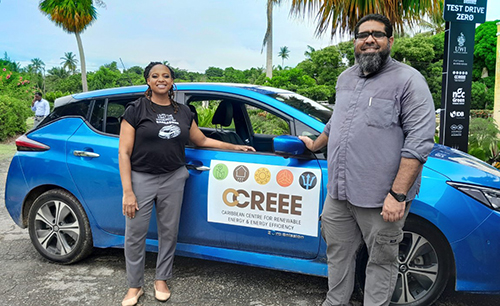Rum and Sargassum Inc., a local deep-tech startup, in collaboration with The University of the West Indies (UWI) Cave Hill campus, has unveiled the first vehicle powered by bio compressed natural gas (CNG). First Bio CNG vehicle in Barbados shows country is driving towards green fuel rapidly.
This innovative bio-CNG utilizes wastewater from rum distilleries and biomethane sourced from sargassum, an invasive seaweed affecting the region’s coasts. The initiative aims to transform the seasonal challenges posed by sargassum on local beaches into a valuable resource, supporting Barbados’s goal of becoming a 100% renewable energy and carbon-neutral island by 2030, according to the media report.
Led by Rum and Sargassum Inc., the project marks a significant advancement in sustainable development for the Caribbean, aided by partners such as the Caribbean Centre for Renewable Energy and Energy Efficiency (CCREEE).
Dr. Legena Henry and her team from the Renewable Energy Development Laboratory at the Cave Hill Campus developed the biomethane fuel. At the vehicle launch, she highlighted the campus as a hub for innovation, celebrating Barbados’s leadership in the energy transition, the media report further added.
Dr. Henry acknowledged the support from CCREEE, noting its crucial role in providing an electric car for test drives. The vehicle, now dubbed ‘Runs on Sargassum,’ showcases the project’s potential.
Looking ahead, Dr. Henry outlined plans for a biogas station, with a small facility already established at the Guinea Estate on four acres of agricultural land. She described the process as circular, explaining that “the digestate feeds the land, but the gas fuels cars,” promoting sustainability in both agriculture and transportation.
Professor Clive Landis, Principal and Pro-Vice Chancellor of UWI Cave Hill, commended Dr. Henry’s efforts, linking her work to the university’s mission of creating value from ideas. He emphasized that this project exemplifies UWI’s strategy to evolve into an entrepreneurial institution that leverages research for societal benefit.
He noted, “Dr. Henry is not only addressing the environmental challenges posed by sargassum but also generating value for the university, which is an equity partner in the venture.” He indicated that the sargassum-powered vehicle is just the beginning, with plans for additional innovations, including products for pest control and diabetes treatment.
According to the news report, Senator Lisa Cummins, Minister of Energy and Business, described the project as a major milestone in Barbados’ renewable energy journey. With approximately 150,000 fossil fuel vehicles in the country, she highlighted the significance of this innovation in the transportation sector as Barbados aims for net-zero carbon emissions.
“Electrification and the use of renewables in transportation are vital for our energy transition,” Minister Cummins stated, suggesting that the project could help shift public perceptions about renewable energy.
She also pointed out the broader regional potential of sargassum, urging the Caribbean to seize this opportunity. “Barbados has pioneered technology that can transform transportation across the region, and we must not take that for granted,” she added, expressing confidence in the nation’s continued leadership in renewable energy.
The launch event was organized by Rum and Sargassum Inc. and Supernova Lab of Future Barbados, with sponsorship from CCREEE, UWI, NGC Green Company Limited, the National Petroleum Corporation, the Inter-American Development Bank, the Caribbean Climate-Smart Accelerator, TOSL Engineering Limited, and RL Mark & Company.





